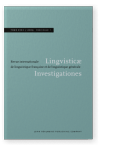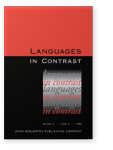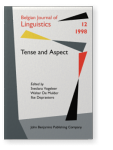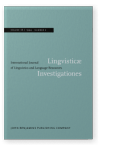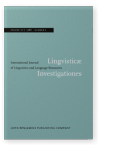Dulcie M. Engel
List of John Benjamins publications for which Dulcie M. Engel plays a role.
2009 A minor issue? Function and structure in French minor sentences Lingvisticæ Investigationes 32:1, pp. 33–54 | Article
‘Minor sentences’ is one of the many terms used in the literature to refer to a phenomenon usually relegated to an obscure paragraph of the grammar book, or treated principally as a spoken discourse feature. These forms are also referred to as sentence fragments, incomplete sentences, verbless… read more
1999 Radio Talk: French and English perfects on air Languages in Contrast 2:2, pp. 255–277 | Article
It has often been observed that present perfect forms in English and French have quite differing functions. These perfects are considered here in a parallel description of English and French radio talk. An examination of talk shows and news bulletins in two corpora of the same length and from the… read more
1998 A Perfect Piece? The Present Perfect And Passé Composé In Journalistic Texts Tense and Aspect: The contextual processing of semantic indeterminacy, Vogeleer, Svetlana, Walter De Mulder and Ilse Depraetere (eds.), pp. 129–147 | Article
Abstract. The French Passé Composé (PC) has long been a source of interest to scholars, in particular in relation to the Passé Simple, which it is seen to have replaced to some extent. The English Present Perfect (PP) has also aroused much interest for its wide range of functions, and apparent… read more
1994 Plus-Que-Parfait: Past anterior or past punctual? Lingvisticæ Investigationes 18:2, pp. 223–242 | Article
Plus-que-parfait: past anterior or past perfect? Following the author's investigation into the use of plus-que-parfait, passé antérieur and passé surcomposé by means of a gap-filling exercise administered to native speakers (Engel forthcoming), it appears that plus-que-parfait (PQP) is not a rival… read more
1986 Word Order and Tense Choice in Standard Written French Lingvisticæ Investigationes 10:2, pp. 331–343 | Article
SUMMARY In modern French, the use of simple and composed tenses varies with respect to word order in two specific cases: firstly with subject inversion, and secondly with insertion of material between the auxiliary and the past participle. With the 'passé simple' (past historic) and the 'passé… read more
